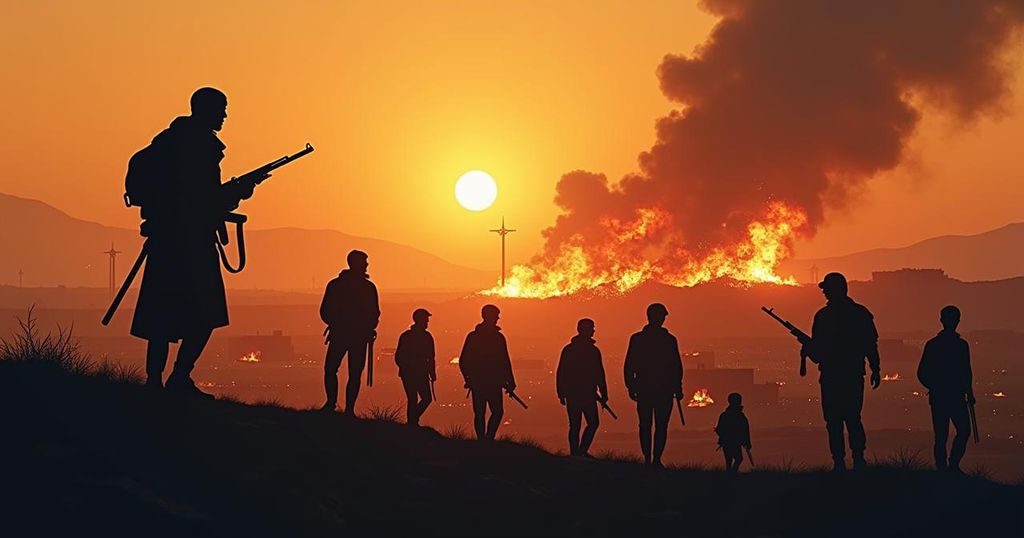Chad’s history is marked by conflict and civil war, notably under the regimes of Hissène Habré and Idriss Déby. Internal strife continued with coup attempts and insurgencies despite several transitions to democratic governance. A significant refugee crisis, particularly from Sudan, compounded the challenges facing the nation. Following Déby’s death in 2021 during a rebellion, Chad entered a new phase of governance led by his son, which signals ongoing uncertainty in the country’s political landscape.
Chad has experienced a tumultuous history marked by internal conflict, civil war, and a significant refugee crisis. The longstanding political instability can be traced back to 1989 when President Hissène Habré faced threats from within his own military ranks. Key military figures, including Brahim Mahamot Itno and Hassan Djamouss, were implicated in plots to overthrow him; while Itno was arrested, Djamouss was killed, and Idriss Déby successfully fled the situation. By late 1990, Déby’s forces captured Abéché, forcing Habré to flee Chad, after which Déby assumed control of the capital, N’Djamena, suspending the constitution and promising a transition to multiparty democracy. Despite initial stability, Déby’s regime faced numerous challenges, including violent opposition and multiple coup attempts. A national conference in 1993 ultimately established a transitional government, adopting a new constitution in 1996 that facilitated the first multiparty elections, resulting in Déby becoming president. Nevertheless, conflict persisted with the emergence of various rebel groups, such as the Mouvement pour la Démocratie et la Justice au Tchad (MDJT). The government’s struggle with rebellion continued into the early 2000s, impacting the socio-economic development the country endeavored to achieve through the discovery of oil. Although oil revenues presented prospects for economic improvement, they were largely redirected towards military spending rather than social programs. Chad’s political scene remained tumultuous, with allegations of electoral fraud arising during Déby’s re-elections in 2001 and 2006. Habré, who had gone into exile, faced trials related to his previous regime’s brutality, culminating in his conviction for crimes against humanity in 2016. Additionally, Chad grappled with border issues culminating from conflicts in neighboring countries, particularly Sudan, resulting in a significant influx of refugees—from 200,000 in 2005. International efforts, including European Union and United Nations peacekeeping operations, were established to mitigate violence and support displaced populations. Despite the pressure from opposition and international entities, Déby maintained his grip on power, enacting constitutional amendments in 2018 that expanded presidential authority. He won the 2021 elections, yet was killed shortly thereafter while combatting rebel forces. Following his death, the military took control, replacing the constitutional leadership with the National Council of Transition and entrusting the presidency to Déby’s son, Mahamat Idriss Déby Itno, marking another chapter of uncertainty in Chad’s political landscape.
The history of Chad is characterized by conflict, marked significantly by various civil wars, military coups, and political oppression. The country gained independence from France in 1960, but instability ensued shortly thereafter, primarily due to ethnic tensions and struggles for power among different factions. The regime of Hissène Habré, who ruled from 1982 to 1990, was noted for severe human rights abuses and corruption. His eventual overthrow by Idriss Déby initiated a new phase in Chad’s political history, featuring attempts at democratization alongside an enduring cycle of violence and insurgency. Moreover, Chad’s geopolitical position as a neighbor to conflict-ridden nations has perpetuated security challenges and refugee crises, further complicating its political dynamics.
In conclusion, the narrative of Chad is one of persistent instability, shaped by political machinations, internal strife, and violations of human rights under various regimes. Despite attempts at fostering democracy and leveraging natural resources for development, the interventions have often resulted in the exacerbation of conflict rather than resolution. The death of Idriss Déby in 2021 has once again raised questions regarding the future governance of Chad, highlighting the fragility of peace in a nation still burdened by its tumultuous history.
Original Source: www.britannica.com






